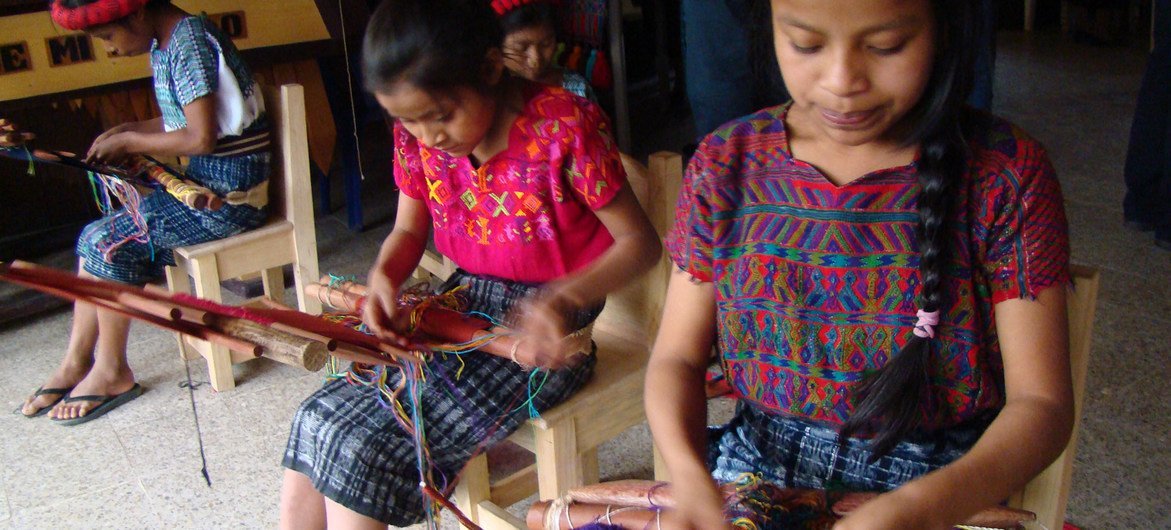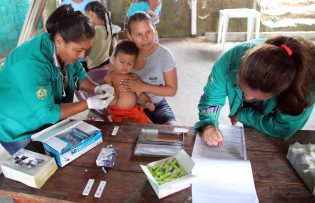
Indigenous peoples are also implementing preventive and protective measures – providing key messages and launching media campaigns in indigenous languages to ensure greater awareness and outreach. These and many other practices are vital to preserve indigenous peoples’ and their communities and cultures, as they continue to be disproportionately impacted by the pandemic.
Indigenous youth in many communities are playing a key role in supporting community decisions, by enforcing restrictions and lockdowns, distributing essentials and health equipment, as well as gathering information on the impact of the pandemic. Elders, who are the guardians of history, traditions, languages and cultures of indigenous peoples are particularly vulnerable, and deserve special attention to prevent an immense bio-cultural loss.
Indigenous women, who are responsible for the health, nutrition and care of their families and communities, are bearing a huge toll in this pandemic. Their main source of income from handicrafts, vegetables and other products, is currently curtailed, as they struggle to provide for their families. Indigenous children – especially those located in remote areas who do not have access to essential distance learning tools such as Internet access and are experiencing a digital divide, will most likely be placed even further behind. Special measures are needed to address the challenges faced by indigenous peoples in different parts of the world, in particular indigenous women and children.
COVID-19 is by far not the only threat to the health and survival of indigenous peoples, who face numerous challenges, including poor access to sanitation, lack of clean water, inadequate medical services, widespread stigma and discrimination in healthcare settings, and land grabbing and encroachment on their lands. Nevertheless, indigenous peoples maintain practices that can serve as inspiration in combatting the COVID-19 pandemic globally, and their collective traditions and strong support systems in their communities can serve as an inspiration to all communities.
The commemoration of the 2020 International Day of the World’s Indigenous Peoples will offer a glimpse of the challenges and responses faced by indigenous peoples during this pandemic, as well as good practices that can be shared around the world.
Learn more about the 2020 International Day of the World’s Indigenous Peoples.
International Day of the World’s Indigenous Peoples 2020
9 August commemorates the International Day of the World’s Indigenous Peoples. It is celebrated around the world and marks the date of the inaugural session of the Working Group on Indigenous Populations at the United Nations in 1982.
As part of the commemoration, the Indigenous Peoples and Development Branch – Secretariat of the Permanent Forum on Indigenous Issues/DISD/DESA, will be organizing a virtual event, bringing together indigenous peoples’ organizations, UN agencies, Member States, civil society and relevant stakeholders.
This year’s theme is COVID-19 and indigenous peoples’ resilience. The virtual commemoration will feature an interactive panel discussion on the innovative ways indigenous peoples continue demonstrating resilience and strength in the face of the pandemic while confronting grave threats to their survival. The aim is to highlight how the preservation and promotion of indigenous peoples’ traditional knowledge and practices can be leveraged more fully during this pandemic. Panelists will share good practices with the audience through an interactive virtual event that will focus on building back stronger.
What: 2020 International Day of the World’s Indigenous Peoples.
When: Monday, 10 August 9 am to 11 am Eastern Standard Time (EST).
Where: Please access the virtual commemoration by clicking here. If you are unable to join the event via zoom due to limit of participants reached, please make sure to view the event on our Facebook page.
Simultaneous interpretation will be available in French, Spanish, Portuguese and Russian. With thanks to the Indigenous Peoples’ Centre for Documentation, Research and Information (DOCIP).
Who: Indigenous Peoples, Member States, UN agencies, funds and programmes, civil society and the general public are invited to attend.
- Concept note |EN|
- Programme |EN|
- Message of the Secretary-General |AR |EN| ES| FR | RU| ZH|
- Remarks by Mr. Liu Zhenmin, Under-Secretary-General for Economic and Social Affairs: |EN|
- Remarks by Ms. Anne Nuorgam, Chair, United Nations Permanent Forum on Indigenous Issues: |EN|
- Statement by the Permanent Mission of Mexico to the United Nations, Chair, Group of Friends of Indigenous Peoples: |EN|
 Welcome to the United Nations
Welcome to the United Nations
